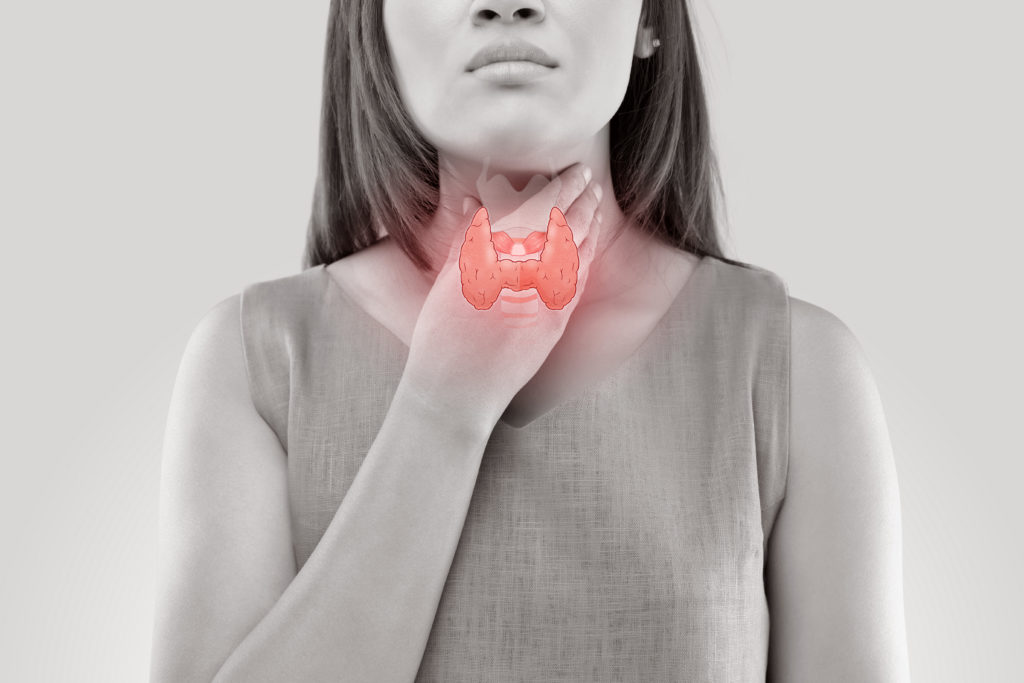January 20, 2022
Author: Angela Trotter, M.S., CNS, AFMCP, Clinical Functional Nutritionist

Did you know that women are more likely than men to have thyroid disease? In fact, According to the American Thyroid Association, one in eight women will develop thyroid problems during her lifetime! In women, thyroid disease can cause problems with the menstrual cycle, problems during pregnancy, and can contribute to difficulties getting pregnant.
Additionally, the thyroid is essential for the regulation of many body processes such as metabolic rate, heart, muscle, and digestive function. It also plays a role in both brain development and bone maintenance. Maintaining a proper balance of thyroid hormone, which includes triiodothyronine (T3) and thyroxine (T4), is vital to keep these body processes properly regulated.
Hypothyroidism is the dysfunction of thyroid hormone performance leading to low thyroid levels and decreased thyroid hormone function.
The most common form of hypothyroidism is the autoimmune condition Hashimoto’s thyroiditis, in which an immune response impairs the proper production of thyroid hormone. Ultimately, the body is mistakenly attacking the thyroid gland in response to something the immune system has signaled as a threat within the body or coming from the outside environment.

Common Symptoms of Hyperthyroidism:
- Fast heart rate
- Heart palpitations
- Anxiety/nervousness
- Excess sweating
- Fatigue
- Heat intolerance
- Abnormal protrusion of eyes
- Insomnia
- Hand tremor
Common Symptoms of Low Thyroid:
- Fatigue
- Weight gain
- Glucose intolerance or insulin resistance
- Dyslipidemia
- Atherogenesis
- Poor pregnancy outcomes

In some other cases, we can see the opposite symptomatic presentation in which hyperthyroidism is experienced resulting in Grave’s disease. This is an autoimmune disorder in which the autoantibodies activate the thyroid gland and ultimately stimulate the hormone receptor to produce an excessive amount of thyroid hormone.
With these particular presentations, we can begin to see why it is vital to do a full panel of thyroid hormone biomarkers to ensure we are not missing a potential immune response that is affecting thyroid hormone production. In other cases, such as where there is no immune response, we may be dealing with suboptimal communication from the brain down, as seen when the release of cortisol in a stress response impairs the communication from the brain (pituitary) to the thyroid. We may also see, in some cases, factors like stress or impaired adrenal function prevent a cell’s proper utilization of the thyroid hormones.
Additional Factors that Inhibit Proper Production of Thyroid Hormone:
- Stress
- Nutrient deficiencies
- Food sensitivities/allergies
- Sleep deprivation
- Adrenal Dysfunction
- Oxidative stress
- Infection
- Trauma
- Changes in Gut Microbiota
- Toxins (such as pesticides, mercury toxicity, etc.)
- Celiac disease
- Low calorie diets
- Inflammation and cytokines
Properly assessing thyroid function will be necessary to ensure optimal functioning. Serum testing to analyze thyroid function may include: TSH, free T4, free T3, and a review of immune response with Thyroid Peroxidase Antibodies, Thyroglobulin Antibodies, and Thyroid Stimulating Immunoglobulin for those with hyperthyroid-like symptoms. Other biomarkers that can be checked may include Reverse T3, RBC (red blood cell) selenium, RBC zinc, serum iodine, 25-OH vitamin D, and ferritin.
As January is Thyroid Health awareness month, we strongly encourage you to notice and be aware of possible signs and symptoms of a potential thyroid condition. If you are experiencing any of these signs or symptoms, consult with your healthcare provider and bring your questions about assessment, testing, etc. For information on ways to support your thyroid health, Contact Angela Today
Author: Angela Trotter, M.S., CNS, AFMCP, Clinical Functional Nutritionist
*Please Note: The information provided on or through this website or blog is for educational and informational purposes only and solely as a self-help tool for your own use. Engaging with this material does not constitute a client/therapist relationship*

Comments